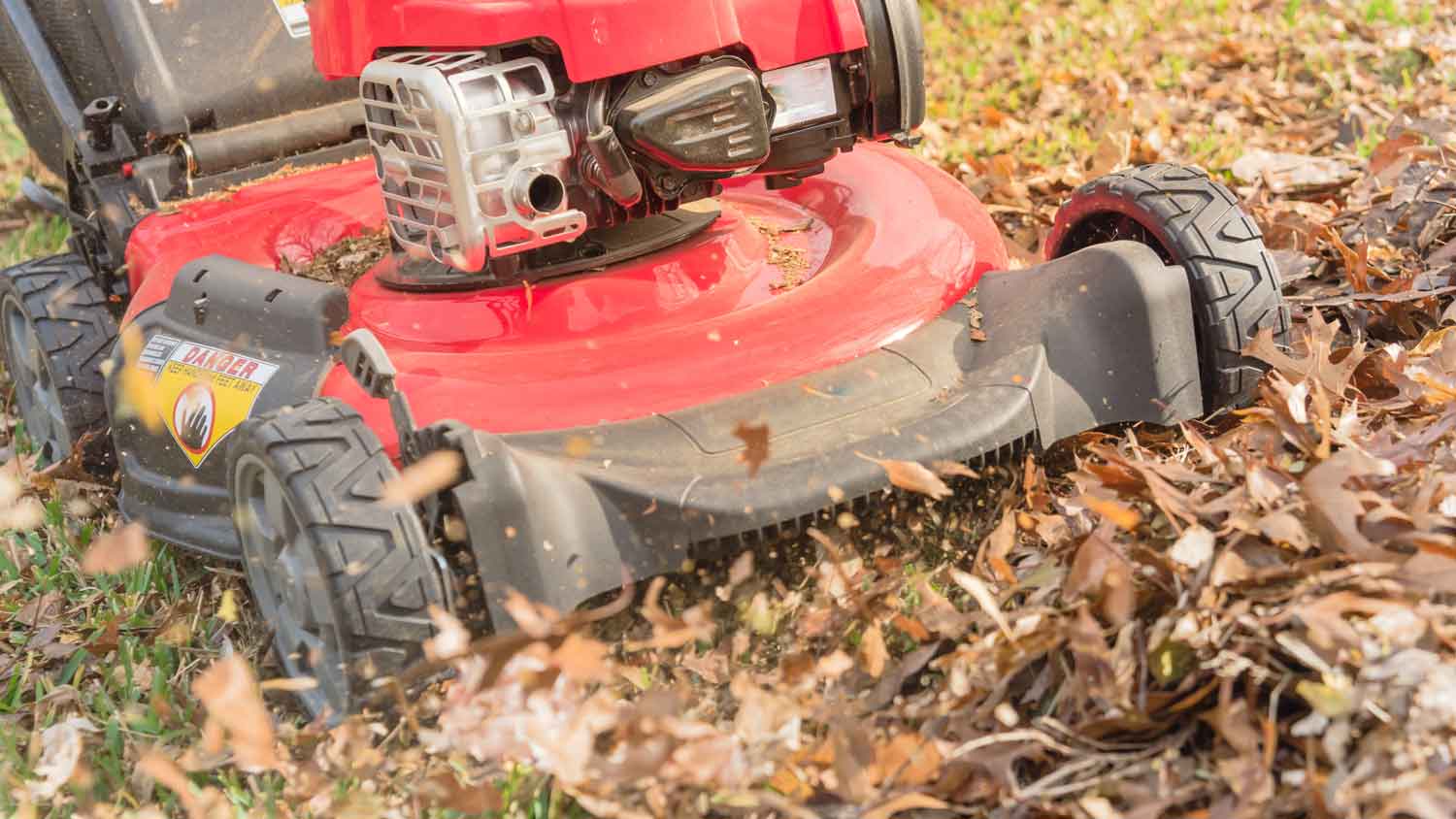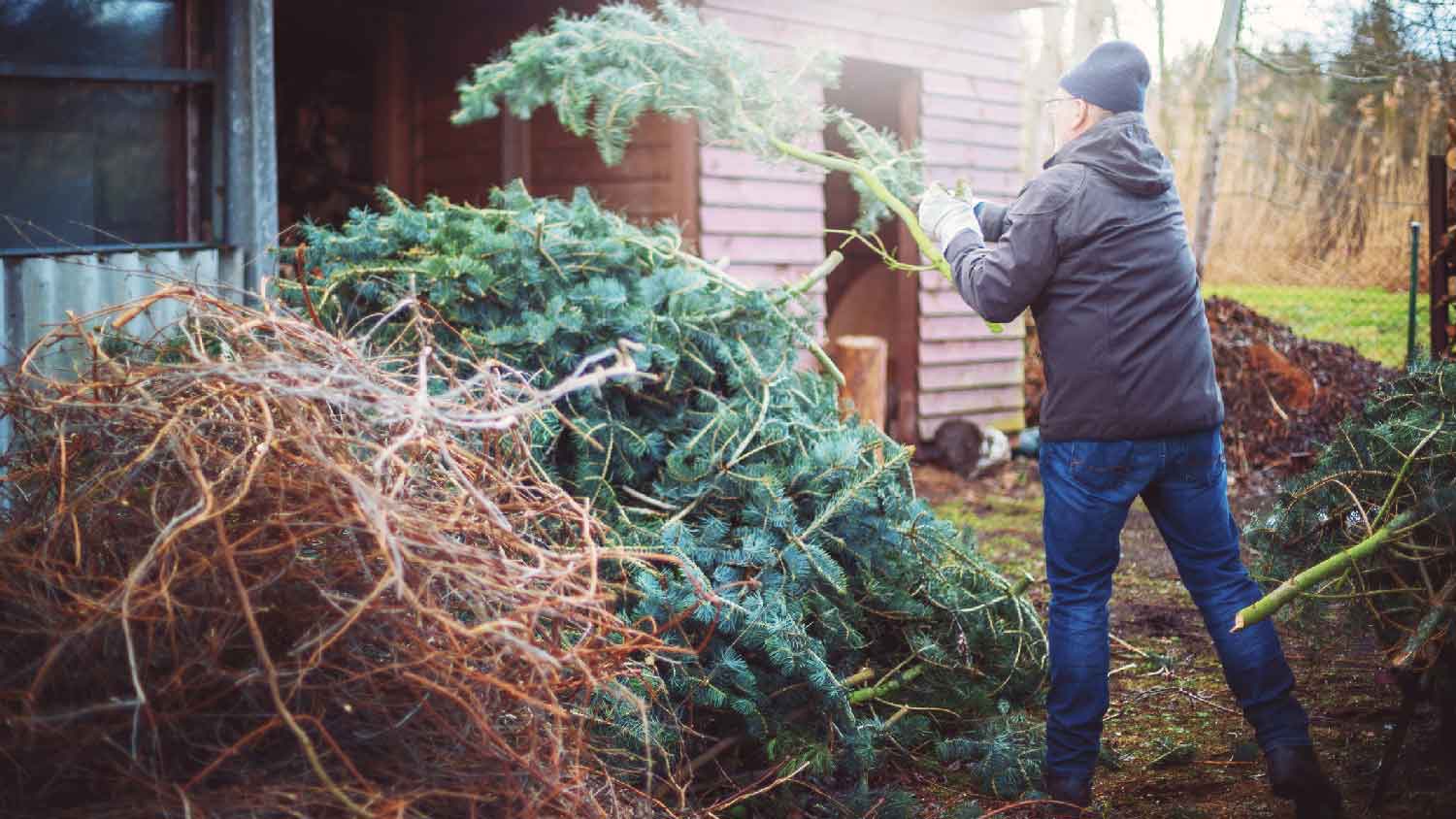Should I Rake Leaves or Leave Them on My Lawn?
Forget raking and leave your leaves alone this fall


Not raking your leaves frees up your time and energy.
Instead, you can make your own mulch with decomposing leaves.
Mulching is better than raking for your yard and the environment.
Once autumn leaves start falling, the seemingly unending cycle of raking and removing them begins. But there’s good news for homeowners who want to avoid tired feet, sore arms, and time lost to raking. Mulching your leaves is a quicker, easier way to deal with them that benefits your lawn. Learn why you may want to avoid raking and reclaim your weekends to enjoy your yard instead of clearing it.
Should You Rake Leaves?
While many people have traditionally raked and bagged leaves to get them off the ground, it may be better for your yard and the environment to mulch them instead. Mulching leaves will aid in decomposition, which adds vital nutrients back into your soil. Yards with heavy tree cover may need some leaves removed to prevent smothering the grass, but mulching a portion of the leaves can help keep your soil healthy.
Benefits of Not Raking Your Leaves
Yard Trimmings Create Landfill Waste
According to the Environmental Protection Agency, landfills received about 10.5 million tons of yard trimmings in 2018. That means that bags of leaves removed from homes are creating more waste in landfills around the country. Although the bags you put your leaves in are often biodegradable, they take a while to break down and can combine with organic waste to create methane, which is a greenhouse gas.
Leaves Can Help Support Lawn Health
You may think that you need to remove leaves from your lawn in order for it to stay in good condition and grow, but that’s not necessarily the case. The decomposing leaves will release nutrients to your grass over time, leading to a healthier lawn. However, if your leaf coverage is more than 20 to 30%, you may need to rake a layer or two to prevent matting.
Make Your Own Mulch
Believe it or not, mulching your leaves can preserve soil moisture, help get rid of pesky weeds, and protect your grass’s root system. If you own a lawn mower or have access to one, you can push it over piles of leaves to chop them into small pieces that are easier to spread around and use as DIY mulch. By mulching your own leaves, you can do your part to reduce greenhouse gases and eliminate waste.
Create Nutrient-Rich Compost
If you have excess leaves in your yard, use them to facilitate growth in other areas or your lawn or garden. Gather leaves using a rake, leaf blower, or leaf tarp and add them to a compost bin or a corner of your yard. Use the leaves to create layers among grass clippings, food waste, and other materials to create the baseline of a compost pile.
Promote Biodiversity
Fallen leaves can attract beneficial insects that help with soil health and act as a food source for wildlife. While your first instinct might be to keep insects far away, allowing them to thrive can help keep your yard healthy. Beneficial insects can also act as natural pest control for invasive and destructive pests, speed up leaf decomposition, pollinate plants, and enrich your soil.
Cons of Not Raking Your Leaves
In some cases, not raking your leaves can have negative consequences. If you’re worried about problems from leaving your leaves, consider a combination of raking and mulching instead of just doing one or the other.
Grass Damage
Yards with numerous trees can have a thick layer of leaf cover come fall, and too many leaves can smother the grass. Without access to sunlight, grass may die, and a thick layer of leaves may retain too much moisture, leading to mold or fungal growth that can harm your lawn. Too many leaves may also prevent plant and tree roots from getting necessary water, inhibiting growth and potentially killing wanted plants.
Destructive Pests
Thick leaf cover provides an appealing habitat for pests like mice and voles. These pests can carry diseases, cause lawn damage, and even find their way into your home. Removing or mulching leaves can prevent hiding places that can act as habitats for destructive pests.
Safety Hazards
Leaves can be very slippery, so leaving them in areas that see a lot of foot traffic can be dangerous. For safety’s sake, clear leaves off of walkways, patios, stairs, and any areas you frequently walk on. Remove pine needles and other yard debris, too—they can pose safety risks.
DIY vs. Hiring a Pro to Remove Leaves From Your Yard

Raking leaves can be time consuming, especially if you have a heavily treed yard. And, depending on where you live, leaves can fall for several months out of the year—adding to the upkeep and time spent raking, scooping, and bagging. You can DIY leaf cleanup if you don’t mind putting in the time and physical labor.
Some municipalities provide leaf removal services, but if yours doesn't, you still have a few options. Consider composting your leaves or turning them into organic mulch. Never burn your leaves, though --- this is not only a fire hazard but the smoke can be harmful to your health and the environment
If you don’t have the time or energy to deal with clearing or reusing your leaves, consider hiring a leaf removal company near you. When hiring a leaf removal service or hiring someone to rake leaves, talk with companies in your area about disposal methods, and prioritize those that reuse or compost leaves from clients to avoid adding to landfill waste. Keep in mind that professional leaf removal costs $200 to $600.
Frequently Asked Questions
It depends on where you live—but in most areas, leaves begin falling in September and continue falling until January or February. Warmer regions, such as Southern states, may see leaves fall a bit later in the calendar year. It also depends on the type of trees in your yard and their maturity.
Leaves will decompose fully in one to three years. You can speed up the decomposition process by mulching the leaves—smaller pieces will break down faster than whole leaves. Exposing leaves to sunlight and water can also help them decompose faster, so spread out large piles into thinner layers.
Always remove leaves from hardscapes and other lawn features. Leaves and other yard debris can become slippery and dangerous, and fallen leaves can discolor and stain materials like stone, brick, and concrete. Use a rake, brush, or leaf blower to remove leaves from hardscapes and prevent staining.





- Pros and Cons of Mulching Leaves: What To Know
- What to Do With Leaves in Your Yard: A Complete Guide
- How to Get Rid of Leaves Without Raking: 5 Easy Methods
- Who to Hire to Remove Leaves From My Yard
- How to to Rake Leaves: 12 Tips to Try
- Do You Really Need to Remove Leaves from Your Lawn?
- The Best Way to Bag Leaves: 10 Tried-and-True Tips
- How to Get Leaves Out of Mulch in 4 Simple Steps
- 9 Fall Lawn Care Tips for a Healthy, Thriving Yard
- How to Prepare Your Lawn for Winter: 10 Important Tasks to Do











